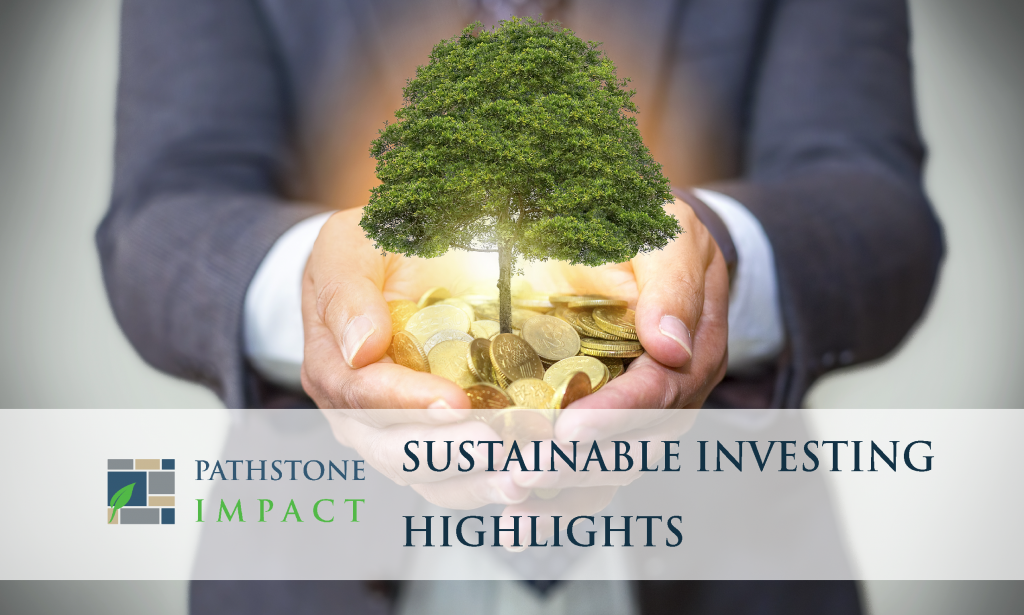Call for ESG Disclosure and Standardization Gains SEC and the EU Support
Companies are increasingly recognizing the need for environmental, social, and governance (“ESG”) disclosure and transparency, pushed by shareholder engagement and as ESG investing gains traction with institutional and retail investors. ESG disclosure and transparency are becoming essential as sustainability has become a central concern for asset managers, consumers, and investors and as the appetite and demand grow. While sustainability remains a concern, there is still no universal standardization on how companies measure and report their sustainability, and this lack of standardization makes apples-to-apples comparisons more difficult. The lack of ESG metric standardization has created complexity and confusion as companies and investors seek to align their business operations and investment goals to ESG metrics.
The gaps within ESG disclosure and standardization might undergo changes in the coming days of 2021. These changes would become imminent as the Security and Exchange Commission institutes rulemaking and guidance on the federal monitoring of environmental, social, and governance (ESG) issues and the European Union (“EU”) enforces the Sustainable Finance Disclosure Regulation 2019/2088 (“SFDR”). Both are keen on ensuring consistency with the approaches put forward by the Task Force on Climate-Related Financial Disclosures and the Sustainability Accounting Standards Board.
As 2021 progresses, SEC proposed rulemaking would require public companies to disclose climate risk. Similarly, the European Union SFDR would force EU companies to “disclose how they integrate ESG factors into their risk processes and investment decision-making processes, as part of their duties towards investors and beneficiaries.” Both the SEC and the EU ESG metrics disclosure proposals would nudge reporting companies towards standardizing ESG reporting frameworks to help companies and investors make informed decisions and pursue decarbonization targets. The call for consistent ESG disclosure through the widely accepted frameworks “will help improve the quality and, ideally, the quantity of comparable ESG data.”
Big Oil, Pension Fund, and Foundation Commit to Fossil Fuel Divestment
Carbon footprint reduction and fossil fuel divestment have continued to gain traction. Big oil companies, pension funds, and charitable foundations have moved to reduce their carbon footprints while striving to meet the 2015 Paris Climate Agreement goal, which is to limit global warming to 1.5 degrees Celsius above pre-industrial temperatures.
Exxon Mobil Corp, the New York Pension Fund, and the Rockefeller Foundation have committed to divesting or disclosing data on fuel use pollution. ExxonMobil Corp, after years of intense pressure by climate change activists and series of concerned shareholders, has agreed to “set new, more ambitious targets to reduce emissions per barrel of oil and disclose, for the first time, data on pollution-related to customers’ use of its fuels.” According to Exxon Mobil, the oil giant “will reduce upstream emissions intensity — those caused by pumping oil and gas from the ground — by as much as 20% by 2025 as well as cutting flaring and methane leaks. Exxon described its new plan as consistent with the goals of the Paris Agreement.”
The New York Pension Fund, one of the largest pension funds in the United States, is also committed to completely moving away from fossil fuel exposure from its investment portfolios. By 2025, the New York State Common Retirement Fund, which disburses some $1 billion in benefits to retirees each year, will sell off its “riskiest” oil and gas stocks, following a review. The state aims to eliminate carbon polluters from its portfolio by 2040. According to Thomas DiNapoli, the New York State Comptroller, energy companies that do not meet state climate risk standards would be divested. Under the leadership of DiNapoli, New York Pension Fund has divested from 22 coal companies, and nine oil sand companies are currently under review.
Recently, the Rockefeller Foundation, a philanthropic organization built by oil magnate John D. Rockefeller 107 years ago, announced it would be divesting entirely from fossil fuel. The Rockefeller Foundation would become the largest private foundation to embrace the divestment movement and divest its $5 billion endowments from existing fossil fuel and commit to refraining from future fossil fuel investments.
In a statement by Rajiv J. Shah, President of the Rockefeller Foundation, “JD Rockefeller started this foundation to promote the well-being of humanity throughout the world, based on science and innovation. This is still our mission, and since the science is clear on the harm caused by fossil fuels, it was time that we officially aligned our internal investment strategy with our external values and mission […], This new policy puts The Rockefeller Foundation in line with our sister organization, the Rockefeller Brothers Fund, and so many other courageous members of the Rockefeller family who have made the point that society needs to rethink growth capital and sustainability for the future.”
Vanguard Group Joins Call for Greater DEI in Workplace and Boardrooms
Calls for more diversity, equity, and inclusion in the workplace and boardrooms have grown since the summer of 2020 protest for social and racial justice. In December, Nasdaq proposed a new rule to the Security and Exchange Commission that would require publicly-traded companies on its exchange to disclose the number of women and underrepresented minorities among their directors. In 2020, the State of California became the first state in the United States to sign a law that would require a publicly-traded company headquartered in California to have diversity on its board.
While the call for broader board diversity gains volume, Vanguard Group, a large fund manager, announced it will begin to track the diversity of publicly traded companies they invest in in 2021. Vanguard Group’s call goes beyond encouraging publicly traded companies to have a diverse board; the fund manager made it explicit that, “Beginning at 2021 annual meetings, the Vanguard funds may vote against directors at companies where progress on board diversity falls behind market norms and expectations. In such cases, we may hold nominating committee chairs or other relevant directors accountable. We will continue to advocate for changes that reflect our view that well-composed boards are in the best interest of long-term shareholders.”
Similarly, BlackRock joins the Vanguard group in this focus. BlackRock released its 2021 stewardship report, which calls for U.S companies to disclose the racial, ethnic, and gender makeup of their employees — data known as EEO-1 — as well as measures they are taking to advance diversity and inclusion. BlackRock, in its stewardship report, vowed that “it will target more corporations and back more investor proposals in 2021 that hold directors accountable when their business practices or disclosures fall short.”
Fund managers such as BlackRock and Vanguard Group are not the only ones calling for a diverse board. Recently, the New York Common Retirement Fund, as an institutional investor, is pushing publicly traded companies to diversify and publish diversity-related data. For instance, the retirement fund became the latest fund to file a shareholder resolution pushing Amazon to audit racism and diversity. According to the filed resolution, Amazon would have to assess its impact on civil rights, racial equity, diversity, and inclusion.
ESG Ratings, Data Providers, and the Data Paradox
The availability of environmental, social, and governance (“ESG”) data has helped investors and asset managers to better understand the alignment and integration of ESG within investment strategies. ESG data gaps and missing metrics remain a paradox for ESG data providers. For instance, ESG data providers use ratings and scores to group companies that have good ESG scores. However, good ESG scores or ratings do not provide a full picture or the granular details regarding how well a company does with their ESG reporting when compared to their industry peers.
Sustainalytics, a leading ESG data provider, sheds some light on why the data paradox exists and what portfolio managers have done to have a robust ESG data framework. According to Sustainalytics, “there are many drivers of shareholder return that fall outside of a typical ESG assessment, including a company’s approach to pricing, its mergers and acquisitions strategy, or its innovation pipeline. ESG factors can significantly influence these matters, but they have not yet become central to mainstream financial analysis. Therefore, portfolio managers who use ESG information typically blend it with other types of information in their investment process, such as traditional financial metrics or market price data.”
As ESG adoption increases among individual and institutional investors, meeting the demand for robust and comprehensive ESG data remains a challenge. ESG data paradox exists because ESG data provider often disagrees on metrics, frameworks, methodologies, and how companies should disclose their ESG data. For instance, Sustainalytics, Refinitiv Eikon, RepRisk, Thinknum, and MSCI each have a different approach to assembling ESG related metrics and often are not transparent with regard to their methodology. RepRisk’s approach diverges from many policy-focused rating frameworks by systematically identifying and assessing material ESG risks that are revealed through public disclosures from third parties and news articles regarding public and private companies worldwide; it does not consider company filings (self-reports), their product lines, or how they are internally structured (e.g., how many women are on the board of directors).
Thinknum is another data provider with a different approach to ESG metrics and methods. Thinknum focuses on assembling alternative data sources for hedge fund managers and others. Thinknum’s alternative data set is being sourced from “public data such as government contracts, product pricing data, store locations, as well as extensive social media data from sources such as Twitter, Facebook, Instagram.”
Addressing the ESG data paradox would require the development of a consensus around the best framework and best data items that are important for the standardization of ESG data. This can be viewed as a “Generally Accepted ESG Principles” and could be modeled on the development of GAAP accounting metrics. Interestingly, GAAP accounting data was not widely embraced as a concept when the concept was first raised, and the structure evolved over a long period of time. Alternative data sources and mandatory disclosures can also help paint a more clear picture of a company’s ESG performance, helping to fill in the details.
Click to download the “Sustainable Investing Highlights – January 2021” PDF.
- https://www.irmagazine.com/reporting/expect-move-toward-assurance-esg-disclosures-experts-say
- https://hbr.org/2020/12/the-future-of-esg-is-accounting
- https://www.barrons.com/articles/esg-standards-convergence-could-happen-in-next-12-to-24-months-accounting-body-chief-says-51607968355
- https://www.natlawreview.com/article/during-biden-administration-sec-will-require-climate-change-risk-and-esg-disclosure
- https://www.jdsupra.com/legalnews/new-esg-requirements-impacting-the-14134/
- https://www.pionline.com/esg/ici-calls-standardized-esg-disclosure-companies
- https://www.nasdaq.com/articles/biden-administration-could-push-for-greater-climate-change-risk-esg-disclosures-2020-12-31
- https://www.natlawreview.com/article/covid-19-update-changes-to-eu-securitisation-regulations-and-capital-regulation
- https://www.jdsupra.com/legalnews/esg-disclosures-guiding-principles-and-67924/#_edn2
- https://www.vox.com/22175698/climate-change-treaty-trump-china-eu-uk-paris-agreement-biden
- https://www.reuters.com/article/us-exxon-mobil-carbon/exxon-mobil-under-pressure-on-climate-aims-to-cut-emissions-intensity-by-2025-idUSKBN28O1TL
- https://www.cnbc.com/2020/12/14/exxon-mobil-begins-to-mount-defense-of-itself-and-a-bigas-activists-circle.html
- https://www.bloomberg.com/news/articles/2020-12-14/exxon-announces-new-emissions-targets-after-investor-criticism
- https://www.huffpost.com/entry/new-york-divest-oil-gas_n_5fcfcd5fc5b626e08a2d754d
- https://www.syracuse.com/news/2020/12/nys-194-billion-pension-fund-will-get-rid-of-big-oil-stocks.html
- https://thehill.com/changing-america/sustainability/energy/530925-5-billion-foundation-started-with-oil-money-divests-of
- https://www.rockefellerfoundation.org/news/the-rockefeller-foundation-commits-to-divesting-from-fossil-fuels/
- https://www.nytimes.com/2020/12/01/business/dealbook/nasdaq-diversity-boards.html
- https://www.usatoday.com/story/money/2020/09/30/california-law-requires-racial-diversity-corporate-boards/5874469002/
- https://about.vanguard.com/investment-stewardship/perspectives-and-commentary/ISBOARD_122020.pdf
- https://www.bloomberg.com/news/articles/2020-12-10/blackrock-plans-to-push-companies-on-racial-diversity-in-2021
- https://www.spglobal.com/marketintelligence/en/news-insights/latest-news-headlines/blackrock-to-ratchet-up-climate-diversity-pressure-on-companies-in-2021-61682438
- https://www.pionline.com/governance/ny-comptrollers-proposals-target-amazon-4-others
- https://www.spglobal.com/marketintelligence/en/news-insights/latest-news-headlines/investors-face-data-gaps-as-they-adjust-portfolios-to-eu-taxonomy-61709233
- https://www.responsible-investor.com/articles/esg-data-quality-tops-list-of-investor-concerns-in-2020
- https://www.morningstar.com/articles/1015608/sustainalytics-how-combining-esg-risk-and-moat-ratings-can-benefit-portfolios
- https://www.hedgeweek.com/2020/12/15/293576/esg-systematic-investing-without-greenwashing-doing-good-while-doing-well
- http://www.integrity-research.com/alternative-data-platform-thinknum-adds-product/
- https://www.hbs.edu/faculty/Pages/item.aspx?num=56372
- https://unstats.un.org/sdgs/indicators/indicators-list
- https://sdg.data.gov/
Please see the PDF version of this article for citations and important disclosures.







